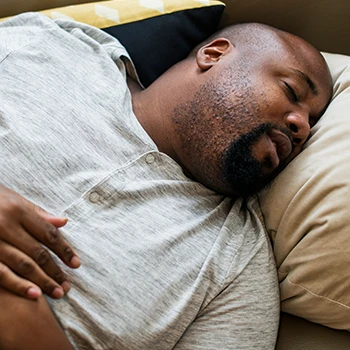My fitness clients come to me with a variety of reasons for wanting to lose weight, and just recently, one of them has asked me if weight loss would curb his snoring.
I knew something about this from my practice, but I researched the topic further by reading countless online studies and speaking with our medical professionals to nail down all the facts.
I found an interesting correlation between weight and snoring, so read on to see what I found.
Quick Summary
- Losing weight can significantly reduce or even stop snoring by decreasing the soft tissue in the airway.
- Various factors contribute to snoring, including obesity, aging, smoking, and sleeping position.
- According to WebMD, losing as little as five pounds can help with snoring.
- I found that a holistic approach combining weight loss, lifestyle changes, and medical advice is most effective for reducing snoring.
Can Losing Weight Help With Snoring?

Yes, losing weight can help with snoring.
Snoring occurs when air does not pass freely through the airway while breathing in and out during sleep.
According to Mayo Clinic, the sound you hear happens when the air flows past relaxed tissues in the upper airway, causing those tissues to vibrate and resulting in the unmistakable snoring sound [1].
Reasons People Snore
There are several reasons people snore and can include the following:
- Alcohol consumption
- Sedative medication
- Smoking
- Head and neck anatomy
- Chronic nasal congestion
- Sleep position
- Being overweight
- Aging
- Hypothyroidism
- Obstructive sleep apnea (OSA)
You certainly have control over many things on the list and can quickly eliminate any relevant ones to see if it reduces or eliminates your snoring.
Not everyone who snores has obstructive sleep apnea, but sufferers of OSA are likely to snore.
Consider speaking with your doctor if your snoring is waking you up frequently at night, you are experiencing morning headaches, there is a pause in your breathing during sleep followed by choking, snorting, or gasping sounds, and you have daytime sleepiness due to sleep deprivation [2].

How Does Excessive Fat Ruin Your Sleep?

According to WebMD, carrying excessive fat can ruin your sleep because of increased soft tissue in the airway, which can lead to developing sleep apnea or snoring [3].
Excessive weight can lead to the aforementioned sleep apnea.
OSA can lead to other health conditions like cardiovascular and metabolic issues such as Type 2 diabetes and eye disorders like glaucoma [4].
Sleep apnea treatment includes losing weight (if necessary), avoiding alcohol and sleeping pills, sleeping on your side, using oral devices, and continuous positive airway pressure (CPAP).
To further reduce snoring, you might try nasal sprays, throat exercises, and avoiding alcohol and sleep medicines.
Snoring Can Make You Gain Fat
Gaining weight and snoring can be a vicious cycle.
Many of my clients say they've experienced this cycle firsthand; their snoring worsened as they gained weight.
If you are overweight and have difficulty sleeping, you may gain even more weight. When you regularly fail to get a good night’s sleep because of excessive snoring, you are less likely to workout out, potentially resulting in weight gain.
And excessive weight can then further make the snoring worse.
Lack of sleep and poor quality also disrupt leptin and ghrelin levels, the hormones that regulate hunger. According to a study in the National Library of Medicine, the imbalance of hunger hormones may cause you to eat more, and exhaustion may result in poor food choices, all of which are factors in weight gain [5].
“Snoring is more than a bedtime annoyance and it shouldn’t be ignored, patients need to seek treatment in the same way they would if they had sleep apnea, high blood pressure, or other risk factors for cardiovascular disease.”
- Robert Deeb, M.D.
Can Weight Loss Improve Snoring?

Weight loss can improve snoring, and countless studies support this. Getting rid of as little as five to eight pounds of excess fat can improve snoring [6].
One study, whose participants were obese men who snored heavily, showed a reduction in snoring with an average loss of 6.6 pounds, and for those who lost more weight, an average of 16.7 pounds, this nuisance was entirely eliminated [7].
It is important to note that while these studies positively support the topic of reducing weight/improving snoring, there may be underlying causes for loud snoring for some people that losing weight will simply not remedy.
How Much Fat Should I Lose?
How much fat you should lose genuinely depends on how overweight you are. According to a study in the ATS Journal, losing about 5-10% of body weight should be able to help with normal snoring [8]. You can make more significant gains toward eliminating it completely by losing more weight.
One PubMed study shows that after participants underwent bariatric surgery and body fat was reduced by 60%, snoring, and sleep apnea episodes ceased in approximately 85% of the participants [9].
Am I suggesting bariatric surgery is a remedy for snoring? No. What I observed in my research is a direct correlation between significant weight loss and a dramatic impact on snoring.
Also, several of my clients say that even a small weight loss made a big difference in their snoring.
Related article: Weight Loss vs Fat Loss
Recommended Physical Activities to Reduce Snoring
For obese individuals looking to reduce snoring through physical activity, the following exercises are particularly beneficial:
- Aerobic Exercises: Activities like walking, jogging, swimming, or cycling improve cardiovascular health and aid in weight loss.
- Strength Training: Building muscle mass through strength training can improve overall body composition and muscle tone.
- Yoga and Pilates: These activities enhance flexibility, improve respiratory function, and promote relaxation, which can positively impact sleep and snoring.
- Breathing Exercises: Specific exercises designed to strengthen the respiratory muscles can be particularly effective.
Note: When beginning a new exercise regimen, especially for individuals who are obese, it's important to start slowly and gradually increase intensity.
Consulting with a healthcare provider or a fitness professional can provide personalized guidance and ensure safety.
FAQs
Can Belly Fat Cause Snoring?
Yes, belly fat can cause snoring because central weight gain (fat accumulates in the midriff) will cause the belly fat to push up the diaphragm and compress the ribcage, lowering lung volume and restricting airflow.
How Can I Stop Snoring Naturally?
You can stop snoring naturally by losing weight if you are overweight, avoiding alcohol and sleep medications, sleeping on your side, quitting smoking, using nasal strips, and raising the head of your bed.
References:
- https://www.mayoclinic.org/diseases-conditions/snoring/symptoms-causes/syc-20377694
- https://www.sleepfoundation.org/snoring/common-causes
- https://www.webmd.com/sleep-disorders/link-between-obesity-sleep-problems
- https://www.webmd.com/sleep-disorders/sleep-apnea/understanding-obstructive-sleep-apnea-syndrome
- https://www.ncbi.nlm.nih.gov/pmc/articles/PMC535701/
- https://www.webmd.com/sleep-disorders/understanding-snoring-prevention
- https://www.verywellhealth.com/how-weight-loss-may-improve-your-sleep-3015194
- https://www.atsjournals.org/doi/abs/10.1164/ajrccm/144.3_Pt_1.494
- https://pubmed.ncbi.nlm.nih.gov/15479938/
About The Author
You May Also Like






